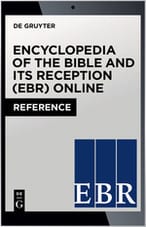The Bible and Films: An Interview with Rhonda Burnette-Bletsch
Rhonda Burnette-Bletsch is a theologian specializing in the relationship between bible and film. In this interview, she shares her knowledge on the visual and the cinematic Bible of today.
This is the second part of an interview series dedicated to the EBR (Encyclopedia of the Bible and Its Reception Online). EBR is a research tool for scholars in biblical studies and related fields
DG: Can you introduce yourself?
Rhonda Burnette-Bletsch: I am Rhonda Burnette-Bletsch. I am a professor of Biblical Studies at Eastern University in Pennsylvania.
DG: And what is your area of research?
RBB: I do a lot of work in Bible and film, finding the intersection between the two media. The visual Bible, the cinematic Bible of today.
DG: How did you develop that interest?
RBB: Well, I work with a lot of biblical reception in film and really defining what biblical reception in film is, because reception history is such a new area of research that we’re really on the frontier and at the beginning of biblical scholarship here. Of course, with biblical reception what everyone thinks of first are the biblical epics: Cecil B. DeMille and the golden age of biblical epics where you actually have a Bible story that is filmed, but there is so much more than that. There are also films that reference the Bible, films that have parallels to the biblical texts and the Bible is something that exists not just in churches or in the academy, but in culture as well. So sometimes, the Bible can end up in film even if the filmmaker did not intend that to happen.
DG: What do you find interesting or fascinating about the relationship between bible and film?
RBB: I love that film is a place where the Bible is appropriated for certain purposes and it gets brought into conversations with other discourses as well. For example Aronofsky’s Noah. One of the things I think makes Aronofsky interesting in that film is how he attempts to define masculinity, what makes a man – and it uses the story of Noah to do that. So, the Bible has a lot of ideological power in Western culture. It can be used to not only talk about religion, but about gender, economics, and politics, and so many other things as well.
DG: And when it gets into the realm of ethics? How do film and bible and ethics come together?
RBB: Well, frequently the Bible is used to set limits on what is and isn’t acceptable. It enters into discussions on gay marriage or gender identity or sexual preferences, on defining and limiting women’s roles. You’ll often find it used in that way, and you’ll often find its use to do that critiqued in film. So, I find that fascinating to trace.
DG: How can you bring all of that to the encyclopedia EBR?
RBB: Well, EBR is on the frontier of biblical reception, so often we are posing these questions for the first time. I’ll begin an article thinking there really won’t be that much material out there and as you begin to scratch the surface there is more and more underneath. You discover that all of the sudden you have gone way over the size limit and will be begging forgiveness for this from the editors and the editorial team in Berlin. They’re all such very nice people, they let us do that usually. One of the things I love most about my work with EBR is that it opens up so many new research possibilities. Things that I never would have thought about perusing before, questions I would have never thought of asking. It’s been very, very fruitful.
DG: What kind of tasks do you have? What do you like about them? what’s good about them or not so good about them?
RBB: I’ve been an editor for EBR for the area film for about a decade now. That involves deciding what articles need coverage in film, finding authors for these articles, reviewing and editing those articles, and often writing them myself. It’s a wonderful chance to develop a network of connections to people who have similar research interests. It has often been very fruitful and lead to other projects.
DG: Is there anything else in general that you’d like to say about EBR?
RBB: EBR has been a wonderful opportunity to work with an international group of scholars in a wide variety of fields that normally I would not be able to interact with, because our fields are so disparate. That has been very enriching for my own research.
Watch the full interview below!
You are currently viewing a placeholder content from YouTube. To access the actual content, click the button below. Please note that doing so will share data with third-party providers.
[Title Image by spooh on Getty Images ]
